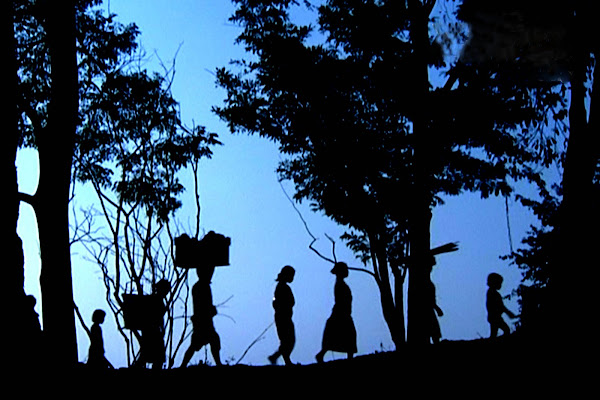Sunday, December 13, 2009
Taare Zameen Par and A Wednesday in Indian panorama for IFFI 2008
By Indiantelevision.com Team
(24 October 2008 8:00 pm)
NEW DELHI: Three highly lauded Hindi films on relevant social issues - Taare Zameen Par, A Wednesday and Summer of 2007 - and the award-winning Kannada film Gulabi Talkies form part of the 26 feature and 21 non-feature films of the Indian Panorama selected for the International Film Festival of India in Goa next month.
The juries submitted their reports to Minister of State for Information and Broadcasting Anand Sharma this afternoon.
In addition, the Malayalam feature film Pulijanmam by Priyanandan and the non-feature Bengali Bishar Blues by Amitabh Chakraborty get automatic entry for having won the best film awards in their categories in the 54th National Film Awards.
The jury for the feature films recommended that Kanachivaram (Tamil) by S Priyadarshan and Mahasatta (Marathi) by Ramesh Laxman More be sent for the Competition Section of the IFFI.
The feature jury recommended that Yarwng, a film in Kokborok language of Tripura by Joseph Pulinthanath, be the inaugural film of the Panorama Section.
The features include six in Malayalam, four each in Hindi and Tamil, three each in Marathi and Kannada, one each in Bengali, Assamese and Telugu, and one which is in English/Gujarati and Hindi.
The seven-member Jury for Feature Films headed by critic and filmmaker K N T Sastry saw 104 films while the five-member Non-Feature Film Jury headed by filmmaker Anjan Bose saw 82.
The award-winning Jayaraj is the only filmmaker to have films in both the feature and non-feature sections.
Apart from Pulijanmam, the Malayalam films are Vilapangalkkappuram by T V Chandran, Gulmohar by Jayaraj, Atayalangal by M G Sasi, Oru Pennum Randaanum by Adoor Gopalakrishnan, Aakashagopuram by Manu S Kumaran, and Katha Parayumpol by Mohanan.
The Hindi films are Summer 2007 by Suhail Tatari, A Wednesday by Neeraj Pandey, Taare Zameen Par by Aamir khan, and ‘odha Akbar by Ashutosh Gowariker.
The Tamil films in addition to Kanachivaram, are Kalloori by Balaji Sakthivel, Mudhal Mudhal Mudhal Varai by Krishna Seshadri Gomatam, and Billa by Vishnu Vardhan.
The Kannada films include Gulabi Talkies by Girish Kassarvalli which won the best Indian film award at the Tenth Osian’s-Cinefan Festival of Asian and Arab Cinema, Banada Neralu by Umashankara Swamy, and Gubbachigalu by Abhaya Simha.
Apart from Mahasatta, the Marathi films are Dohaa by Pushkaraj Paranjape, and Valu by Umesh Vinayak Kulkarni.
Apart from Yarwng, the other films are Chaturanga (Bengali) by Suman Mukhopadhyay, Mon Jai (Assamese) by M Maniram, Mee Sreyobhilashi (Telugu) by V Eshwar Reddy, and Little Zizou by Sooni Taraporevala which is in English, Gujarati and Hindi.
The non-features include seven in English, four in Hindi, two each in Bengali and Malayalam, and one each in Kannada, Manipuri, Urdu, apart from one with only music and another which is in Hindi, Bengali and English.
The English films include Distant Rumblings by Bani Prakash Das on the remains of the Second World War in Manipur and Nagaland, A Friend turned Foe by Gautam Saikia, Divided Colours of a Nation by Umesh Aggarwal, Four Women and a Room’by Ambarien Al Qadar, The Journalist and the Jehadi by Ramesh Sharma, The Land of Rupshupas by A K Sidhpuri, and Rehana: A Quest for Freedom by Gargi Sen and Priyanka Mukherjee.
Dhin Tak Dha by ‘ShraddhaPasi’, Apna Aloo Bazaar Becha by Pankaj H Gupta, Children of the Pyre by Rajesh S Jala, and Antardhwani by Jabbar Patel form the Hindi component.
The two Bengali films are The Shop that sold Everything by Abhyuday Khaitan and Yearn to Learn by S K Aboul Rajjak, while the Malayalam films are Vellappokkathil by Jayaraj and Memories, Movement and a Machine by K R Manoj.
The others are the Kannada Putti by Jacob Varghese, the Urdu Parwaaz by Biju Vishwanath, and the Manipuri Ratan Thiyam - the man of Theatre by Nirmala Chanu and Oken Amakcham, apart from Three of Us by Umesh Kulkarni which only has music and Remembering Bimal Roy by Joy Bimal Roy in Hindi, Bengali, and English.
http://www.indiantelevision.com/aac/y2k8/aac660.php
Subscribe to:
Post Comments (Atom)

No comments:
Post a Comment